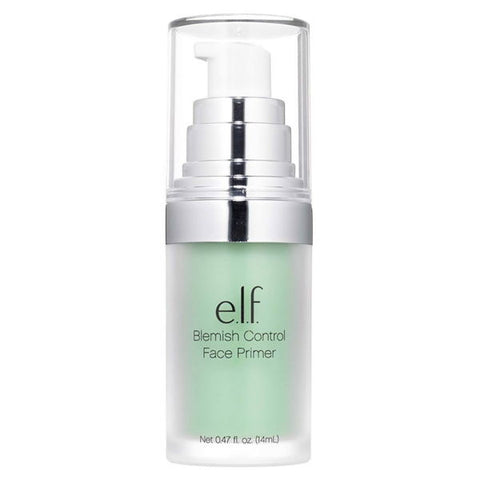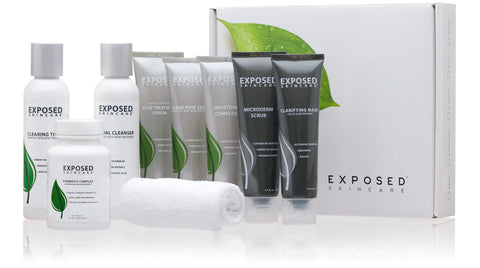When you have acne-prone skin, you may find yourself turning to makeup to cover your blemishes. But how do you know your makeup won't cause even more acne?
The ideal makeup for acne-prone skin has three qualities: it doesn’t irritate, doesn’t clog pores, and either moisturizes, contains acne-fighting ingredients, or both. On top of this, it should also come in a tone that matches and enhances your skin tone while effectively covering blemishes.
In this article, we will get specific about which ingredients to avoid, and we will also give you some products that, we find, genuinely use high-quality, healthy ingredients.
Also read: How to choose the best acne treatment

Makeup Ingredients to Avoid
Just because a cosmetic product claims to be healthy for your skin, that doesn't mean it is. In fact, cosmetics can easily clog your pores or irritate your skin causing acne.
But not all makeup causes acne. In fact, there are some ingredients and products that can be healthy for your skin and even improve acne. You just need to know what to look for, and what to avoid.
Comedogenic Ingredients
"Comedogenic" means anything that causes blackheads or acne. This typically comes from ingredients that block oxygen out of your pores and allow the P. acnes bacteria to grow, causing inflammation and, ultimately, pimples.
If you have acne-prone skin, check for any comedogenic ingredients before purchasing a product.
Examples of comedogenic ingredients:
-
Petroleum derivatives (like mineral oil and petrolatum)
-
Sodium Lauryl Sulfate(SLS) (This is sometimes found in toothpaste)
-
Palm oil
-
Algae extract

Alcohol
Alcohol as an ingredient in skin care products isn't always bad for the skin, but you must consider your skin type.
For someone with extremely oily skin, alcohol may help cleanse the surface of your skin, but for anyone with dry skin, sensitive skin, eczema, rosacea, or any other dry or sensitive skin conditions, alcohol can cause inflammation, irritation, and even more acne.
Another consideration for Muslim makeup users is alcohol as an ingredient in cosmetics may not be considered halal.
Alcohol has many forms and, thus, many names. Here are some ingredient names that essentially mean alcohol.
-
Ethyl
-
Denatured Alcohol or "Denat"
-
Isopropyl (rubbing alcohol)
-
Cetearyl
-
Cetyl
-
Stearyl
-
Methyl
Some Fragrances
Similarly to alcohol, not all fragrances are necessarily negative, but for people with sensitive skin, they can cause allergic reactions and irritation. There are also "makeup" or "skin care" products that are essentially just water and fragrances and that don't really do much for your skin or its appearance.
-
Benzaldehyde specifically is a fragrance that you want to avoid as studies have shown that it can cause blackheads and pimples.
-
Sometimes brands add essential oils to their products for fragrance, but essential oils, when used incorrectly, can be damaging to the skin. We recommend using only products that use essential oils responsibly, such as our acne treatment serum, which uses low percentages of tea tree oil to disinfect the skin but also pairs it with green tea extract to calm inflammation simultaneously.
-
Cinnamal, linalool, limonene, and isoeugenol are the most common fragrance allergens.
Lanolin
Lanolin is a waxy substance secreted by sheep and other animals with wool to protect their fur.
This is an ingredient that, due to its source, should be avoided by people hoping to maintain a strictly vegan diet and lifestyle.
But even if you are not vegan, lanolin is a wax that clogs your pores and causes acne.
Retinol
Retinol has become a popular acne-fighting ingredient, even being used in some makeup products like the PÜR 4-in-1 Foundation Stick.
Retinol works by increasing cell turnover, which can be effective in helping acne and wrinkles, but it also makes your skin extremely photosensitive, meaning "very susceptible to the effects of the sun." Photosensitivity can contribute to premature aging, skin damage, and even skin cancer.
Makeup, specifically products like foundation, primer, concealer, etc. are typically worn on your skin during the day, which means that retinol as an ingredient can make you sensitive to the sun in real-time.
We recommend using skincare products with azelaic acid instead of retinol, because azelaic acid works in the same way as retinol, by increasing cell turnover, but it doesn't have the worrisome side effect of photosensitivity.
Makeup Ingredients to Look For
Here are some makeup ingredients that can help treat acne:
-
Glycerin
-
Cyclopentasiloxane
-
Salicylic Acid
-
Silica
-
Tea tree oil
-
Caffeine
-
Licorice root extract

The Best Makeup for Acne-Prone Skin
While these products may help acne in some ways, remember that no individual ingredient or makeup product will entirely clear your acne. Makeup can cover acne up, but the best way to treat acne is with an effective yet gentle skincare regimen, such as the Exposed Skincare Kits.
Best Foundations for Acne-Prone Skin
Best Liquid Foundation: NYX Professional Makeup Total Control Drop Foundation

This foundation contains three deeply hydrating ingredients—Cyclopentasiloxane, water, and glycerin.
Glycerin is a humectant, meaning that it helps you retain moisture in the skin. This feature is beneficial for anti-aging properties, and also for keeping your skin looking soft and supple without clogging your pores. We use glycerin in our Acne Treatment Serum.
Cyclopentasiloxane acts to strengthen your skin's natural protective barrier. This can mean you have better defenses against allergens, bacteria, and moisture loss by using products that include this ingredient, such as our Moisture Complex. In the NYX foundation, Cyclopentasiloxane provides a fine layer of protection without clogging pores.
Best Powder Foundation: BareMinerals Blemish Rescue Skin-Clearing Loose Powder Foundation

This foundation uses 0.5% salicylic acid. Salicylic acid works by breaking down dead skin, which can unclog your pores as a sort of gentle exfoliant. Salicylic acid can also even decrease your skin's sebum production, so especially if you have oily skin, this foundation that won't clog pores could be helpful for your acne.
Salicylic acid is also quite gentle, and a useful alternative to harsh exfoliants such as those that contain microplastics.
We love salicylic acid and its ability to clear up acne-prone skin, which is why we opt to include it in our acne body wash, clearing tonic, and facial cleanser.
Best Concealer for Acne
For Oily Skin: Bye-Bye Breakout Full-Coverage Treatment Concealer

This concealer contains tea tree oil. While some essential oils can be harmful, tea tree oil used in very small, responsible quantities, can be an effective antibacterial agent and has been shown to reduce acne.
Because tea tree oil can be harmful if used improperly, don't try to use it on your own. Instead, opt for products like the By-Bye Breakout concealer or the Exposed Acne Treatment Serum.
Best of all, this concealer comes in seven shades that span the skin color spectrum. However, it's only suitable for very oily and non-sensitive skin and we don't recommend it for dry skin that is prone to inflammation.
For Dry Skin: Tarte Creaseless Concealer

This Creaseless Concealer from Tarte Cosmetics includes all kinds of hydrating ingredients, and we consider it ideal for dry or sensitive skin.
It contains maracuja oil, vitamin C, vitamin A, and vitamin E. Combined, these ingredients help the skin absorb and lock in moisture. The maracuja extract, despite being an oil, has a low comedogenicity rating, so it shouldn’t clog pores.
Best Primer for Acne-Prone Skin
Unwanted Redness: E.L.F. Cosmetics Blemish Control Face Primer

Green primer is the best option for covering up unwanted redness.
The E.L.F. Cosmetics Blemish Control Face Primer contains 2% salicylic acid, making it effective against blackheads and whiteheads. It’s water-based and it contains a small amount of tea tree oil to help combat pimples too. Because it may irritate sensitive skin, we recommend that users try this product a few times per week at first and slowly increase if no irritation occurs.
Salicyclic acid is an effective acne-fighting ingredient that unclogs pores and can be implemented into your regular skincare routine using the Exposed Facial Cleanser.
Unwanted Dark Spots: Clinique Superprimer Face Primer

Orange primer is the best color primer for dark skin. The orange hue and caffeine in this product can help reduce the dark marks left behind by post-acne discoloration. Caffeine reduces inflammation by constricting the blood vessels slightly, which can decrease the purple hue that sometimes appears around pimples.
This primer is also water-based, contains silica to absorb oil, and includes green tea extract, which can help soothe the skin and reduce inflammation. This makes it a helpful acne prevention tool as well.
Best BB Cream for Acne
Budget: E.L.F. BB Cream SPF 20

The E.L.F. BB cream contains hydrating ingredients like jojoba oil and glycerin, but it also contains silica to absorb oil and hide blemishes.
It contains SPF to protect your skin against harmful UVA and UVB rays. However, we don’t recommend wearing it as your only sunscreen. Because BB creams are applied very thinly, they’re not enough to fully protect against the sun.
Luxury: Iman Cosmetics Skin Tone Evener BB Crème

This is a more expensive BB cream but it is full of great ingredients. It contains hydrating almond oil, grapeseed oil, and glycerin, as well as oil-balancing ingredients like licorice extract, and blemish-reducing ingredients like talc. Talc works by attracting and scattering light to diminish the appearance of blemishes.
Overall, this is a great option for acne-prone skin that comes in many shades.
The Exposed Clear Pore Serum similarly contains licorice extract to reduce dark spots, so that you need less makeup to even out your complexion.
Starting Your Routine Right
While adding makeup to your skincare routine can help you to cover blemishes and even ward them away, nothing can replace a consistent skincare routine using gentle products of high quality.

Just as important as applying makeup is cleansing and moisturizing your face. Other products such as serums, masks, and tonics can clear up acne for good.
Here at Exposed Skincare, we recommend our 3-step system that cleanses, tones, and treats your skin with both natural and scientific ingredients. Using our products each morning before applying your makeup and each night after removing it is guaranteed to reduce your acne.















